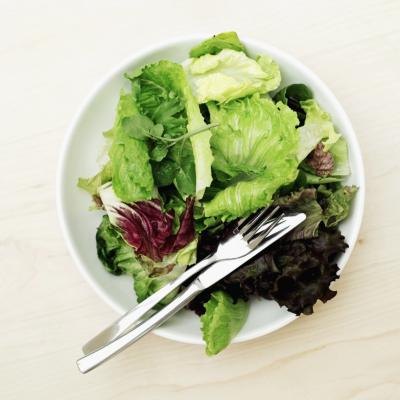
After dinner, it's easy to turn your attention to dessert and, later in the evening, dig into a bowl of chips as you lounge on the couch. Doing so might be tasty, but these diet habits can quickly lead to weight gain. Although salad is traditionally more of a before-dinner meal, enjoying a bowl of salad after you've eaten can help you avoid feeling hungry without consuming too many calories.
Lower in Calories Than Many Snacks
If you're considering eating a salad after dinner, you must weigh its health benefits against the foods you typically eat between dinner and bedtime. If the foods in the latter category are unhealthy, they can elevate your daily caloric intake by hundreds of calories, which increases your likelihood of weight gain. Some people, for example, reach for high-calorie foods as a habit when watching TV in the evening. Although you must be careful to ensure your salad doesn't contain unhealthy ingredients, it's likely lower in calories than the foods on which you might otherwise snack.
Fiber Helps You Feel Full
Many raw salad ingredients are high in fiber. A 7.5-inch carrot, for example, has 2.3 grams of total fiber, and 1 cup of chopped celery has 1.7 grams of fiber. Dietary fiber can relieve constipation, which is useful if your dinner is heavy and slow to digest. Fiber can also help you feel full quickly, which might decrease your desire to snack after dinner.
Salad's Minerals Promote Calm
If your after-dinner snack is high in fat, it can lead to indigestion that makes it difficult to sleep soundly. Salad, however, is lighter and less likely to affect the quality of your sleep, although it's always best to avoid eating right before bed. BBC Good Food notes that calcium and magnesium are helpful to calm your body before bed. These minerals are found in salad ingredients such as kale and spinach.
Skip the High-Fat Ingredients
Tossing a few vegetables in a bowl and dousing them with high-fat dressing or heavy foods such as bacon and cheese isn't a helpful approach. Not only are these foods high in calories, which can promote weight gain, but they're also heavy enough that they might disrupt your sleep. Make the vegetables the centerpiece of the salad and opt for a small amount of light dressing, such as oil and vinegar.
www.livestrong.com





No comments:
Post a Comment